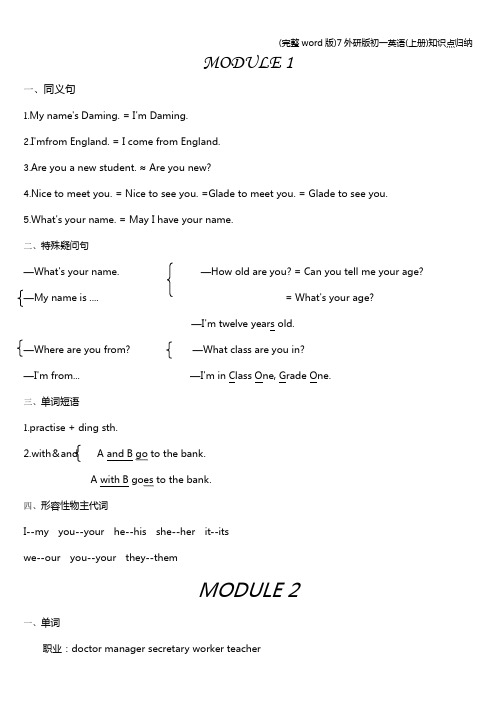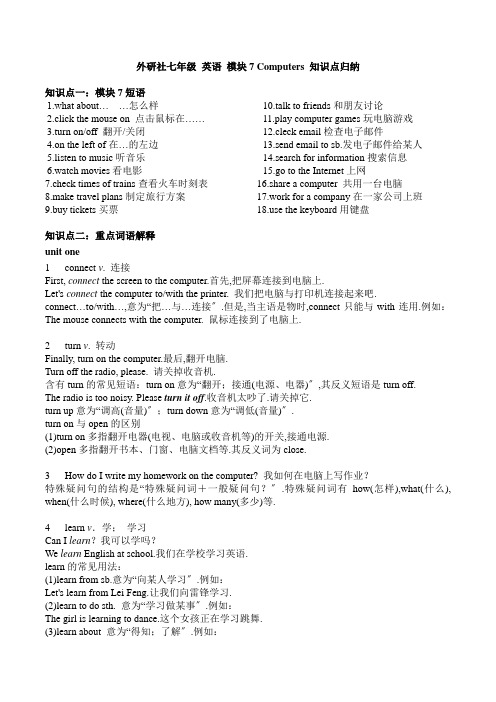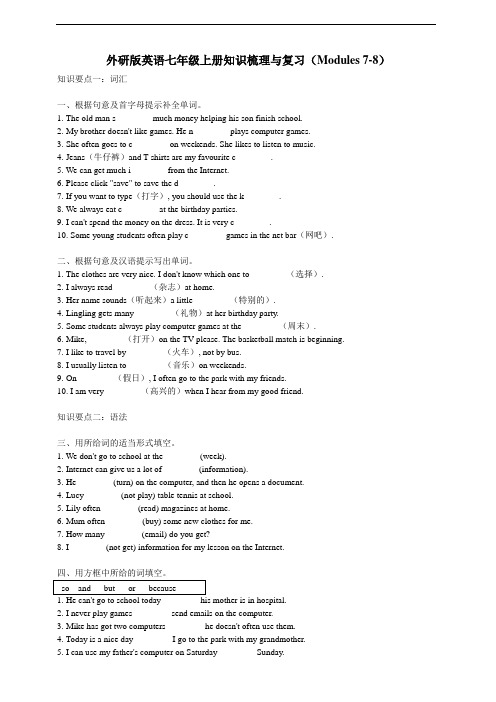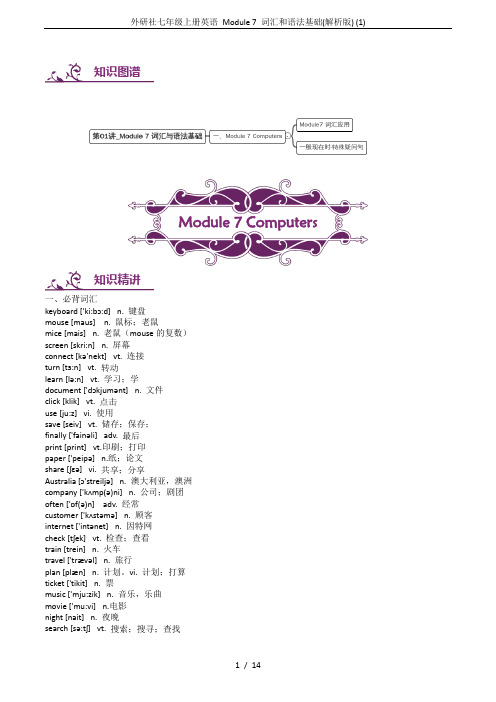外研版初中英语七年级上册M7模块知识点归纳
外研版七年级英语上册 Module7 Unit1_核心词汇讲解(WORD版)

Unit1 核心词汇讲解1.mouse / maʊs/ n. 鼠标,老鼠I use a mouse to choose documents from my files.我用鼠标从我的文件中选择文件。
There are a lot of mice in our house. We must get a cat.我们房子里有很多老鼠。
我们必须弄只猫来。
【拓展】复数形式:mice2.turn / tɜːn/ v. 转动Tom turns his head. 汤姆把头转过去。
【拓展】(1)turn作不及物动词时,意为“转弯;转身”。
She turns and walks back to her house.她转身回家。
(2)turn作系动词时,意为“变得;成为”,一般通过改变状态或形式。
(变味,变色,变质)(3)The weather turns cold. 天气变冷了。
3.learn / lɜːn/ v. 学习I found it difficult to learn a foreign language.我发现学外语是困难的。
【拓展】固定搭配:learn from 向……学习辨析learn; studylearn: 学习,学会,侧重学习的成果,强调通过学习去获得知识和技能。
study: 学习,研究,强调学习的过程,指深入、系统地学习。
4.click / klɪk/ v. 点击You click on the menu, and it drops down.单击菜单,它就向下展开。
e / juːz/ v. 使用We use a pen for writing.我们用钢笔写字。
【拓展】固定搭配:use up 用完use n. 用途It is an electronic device with many uses.它是一部具有多种用途的电子仪器。
6.save / seɪv/ v. 保存,储存He saves his document in his computer.他在电脑上保存了他的文件。
(完整word版)7外研版初一英语(上册)知识点归纳

MODULE 1一、同义句1.My name's Daming. = I'm Daming.2.I'mfrom England. = I come from England.3.Are you a new student. ≈ Are you new?4.Nice to meet you. = Nice to see you. =Glade to meet you. = Glade to see you.5.What's your name. = May I have your name.二、特殊疑问句—What's your name. —How old are you? = Can you tell me your age?—My name is .... = What's your age?—I'm twelve years old.—Where are you from? —What class are you in?—I'm from... —I'm in Class One, Grade One.三、单词短语1.practise + ding sth.2.with&and A and B go to the bank.A withB goes to the bank.四、形容性物主代词I--my you--your he--his she--her it--itswe--our you--your they--themMODULE 2一、单词职业:doctor manager secretary worker teacher工作地点:factory hospital hotel office school university二、短语a photo\picture of my family三、语法(can)Can do sth.I can\can't ride a bike.Can you ride a bike?Yes, I can.\No, I can't.四、句子What does your ... do?=What is\are you ...'s job?=What is your ...?He\She is a ... They're ...MODULE 3一、单词1.building in school: classroom dining hall gym library office science lab2.something: blackboard book classroom computer desk dictionary footballlibrary picture television3.numbers: thirteen fourteen fifteen sixteen seventeen eighteen nineteenthirty forty fifty sixty seventy eighty ninety4.介词:next to ≈ near behind ≠ in front of in on under5.in front of:在......前面in the front of:在......里面的前面 6.right 正确的≠wrong右边的≠left二、语音 er 、or 、ur 发/ə/ 三、语法(There be)----Are there any school offices?----Is there a computer on Miss Li's desk? ----No, there isn't. 注意:1.就近原则:There is some meat and two apple on the desk. 2.名词所有格: Miss Li's herLily and Lucy's 两人共有的 eg: Lily and Lucy's father. Lily's and Lucy's 两人各有的 Lily's and Lucy's fathers.MODULE 4一、family members:aunt uncle grandma grandmother grandpa grandfather mother father mum dad sister brother二、短语句型Thank you forhelping me.asking me.inviting me. Make a family tree for your family.----How many people are there in your family?----There are four. There are my mum and dad, my sister and me.----Have you got an aunt?/any .....?----Yes,I have./No,I haven't.----Have you got a small family or a big family?----I've got a big family.(选择疑问句)or的用法:① 或;② 并列否定:I don't like swimming or dancing.MODULE 5-6一、单词1. orange 橙汁have some orange[U]橙色the oranges are orange[C]橙子This is an orange[C]2.Kind 善良He is very kind.种类=tyre a kind / type of fruit two kinds /types of fruits 3.gym: 不受天气影响的室内体育馆、健身房或运动馆stadium: 周围有看台的露天大型运动场4.healthy ≠ unhealthy keep/stay healthyin good health ≠ in poor/bad healthbe healthy = be in health5.good for one health ≠ bad for one health二、短语see a film / see films = go to the cinemaMODULE 7一、短语about sth.谈论某事talk to sb.get up≠go to bedgo home≠leave home(for)study science/history/chemistry/maths/...二、语法①时间表达法:____ What's the time? What time it is?直 读 法 : It's two ten. (2:10)a cup of tea a glass of water a can of coke a bottle of juice a bowl of rice a piece of meat(当物为代词时,只能 用to 或for 的句型)____ 逆 读 法 : ①It's ten past two.(2:10) ≤30' ②It's ten to ten. (2:50) >30' 整点表达法:It's two o'clock. (2:00)(不用介词)【No. 1】一般现在时的功能1.表示事物或人物的特征、状态。
外研版七年级上册Module 7知识点整理

外研版七年级上册Module 7知识点整理1. primary school 小学2. the name of ………的名字3. be born 出生于4. in England 在英格兰5. in Shanxi Province 在山西省6. quite difficult 非常难管7. on the east coast of America 在美国东海岸8. twelve years ago 12年前9. lots of things to do 许多事情要做10. last year 去年11. last weekend 上周末12. from…to…从…到…重点句子1. Where were you born? 你在哪里出生?2 I was born in…我出生在……3 What was the name of the village? 那个村庄叫什么?4 What was the name of your first school?你上的第一所学校叫什么名字?5 Who was your first teacher? 你的第一位老师是谁?6 She was very friendly.她非常友好。
7 Who were your first friends?你最早的朋友是谁呢?8 He was quite difficult. 他很难管。
9 What were they like? 他们当时是怎样的?10 What were you like? 你当时是怎样的?11 There were lots of things to do in Quincy.在昆西有很多事情可以做。
12 I was very happy there.我在那里非常快乐。
13 There was a big living room with a TV, a kitchen, a bathroom and three bedrooms. 我们的房子又大又舒服,有一间大的起居室,里面有一台电视机,还有一间厨房,一个卫生间和三间卧室。
最新外研版七年级上M7-M8知识点总结.

新外研版七年级上M7-M8知识点总结.重点短语1.connect A to B 连接A到B,把A连接到B2.turn on / off... 打开/关闭(名中后,代中间)turn up / down.... 调高/调低......在电脑上写......4.open a new document 打开一个新文件5.click the mouse on...... 在......处点击鼠标6.in the new document 在新文件里7.save the document 保存文件8.write a name for the document 给文件取个名9.visit sb 拜访/看望某人10.print the document 打印文件11.put some paper in(the printer)把一些纸放入(打印机)12.on Sundays 在星期天13.share sth with sb 和某人分享某物,和某人共同使用某物14.in/at my home 在我家里一位公司的经理16.go on the Internet 上网17.check the times of trains 核查火车时刻表18.make travel plans 制作旅行计划plan to do sth 计划做某事19.listen to music 听音乐20.watch movies=watch a movie 看电影21.every Friday night 每个星期五晚上22.search for some information about... 搜索一些有关......的信息23.check one’s email查收电子邮件24.talk to sb on the Internet 在网络上和......谈话25.send emails to sb 发电子邮件给......打电子游戏2 为一家公司工作28.at/in the cinema 在电影院29.buy train tickets=buy a train ticket 买火车票30.remember to do sth 记住做某事(还没做)31.play music 播放音乐32.plan for our holiday 计划我们的假期e sth to do sth 使用……做…….重点句子我怎样在电脑上做家庭作业?2.What’s next?接下来是什么?请把显示器连接到主机.4.Finally 最后,打开电脑.5.I want to learn how to print a docu ment.我想学习怎样打印文件.我父亲经常在电脑上和他的客户洽谈.7.I also go on the Internet to check my emails.我也上网查看我的电子邮件.8.I listen to music or night .每星期五晚上我在电脑上听音乐或看电影.在我家里没有电脑.10.I play a lot of games and my mother doesn’t like it.我玩大量游戏,我母亲就会不高兴.(我玩大量游戏,我母亲不喜欢这件事.)基本语法点:1.一般现在时的特殊疑问句.注意问句的构成方式和常见的疑问词,请看专题练习.2.注意表达一系列动作的连接词:First...next...then...finally...Module 8重点短语:1.have a birthday party for sb 为某人举行生日派对2.go to one’s birthday party去参加某人的生日派对3.at a Chinese birthday party 在中国人的生日聚会上4.at the birthday dinner 在生日宴会上5.make a birthday cake for sb 为某人制作生日蛋糕6.give/send birthday cards 送生日贺片7.get birthday presents 收到生日礼物8.on one’s birthday在某人的生日(那天)9.a box of chocolates 一盒巧克力10.a cinema ticket 一张电影票a concert ticket 一张音乐会入场券11.choose a birthday present for... 为......选择生日礼物12.stay/keep healthy 保持健康13.get some exercise 进行体育锻炼14.every day 每天15.eleven silk scarves 11条丝绸围巾16.人 spend +时间/钱+on sth 在某物上花费时间 / 钱人 spend +时间/钱+(in) doing sth 在做某事上花费时间 / 钱17.read magazines=read a magazine 阅读杂志18.go to the cinema. 去看电影19.watch sports 观看体育赛事20.go to concerts=go to the concert 去听音乐会21.the CDs of one’s favourite songs某人最喜爱的歌曲的唱片22.go to the football match 去看足球赛23.watch football matches on TV 在电视里看足球比赛24.at weekends = at the weekend 在周末25.watch AC Milan 看AC米兰(的比赛)26.watch films=watch a film 看电影27.stay at home 待在家里28.on Saturday evening 在星期六晚上29.hear from sb 收到某人的来信30.watch sb play football 观看某人踢足球重点句子你愿意来参加我的生日派对吗?Yes, I’d love to./ I’d love to,but....\是的,我愿意./ 我很愿意,但是......2.My mother never makes a birthday cake for me.我母亲从不给我制作生日蛋糕.3.Do you sing it in Chinese or in English?你用中文还是英文唱这首歌呢?4.What would you like for your birthday?对于你的生日,你想要什么呢?5.It’s a secret. 这是秘密.6.What do you often do on Teachers’ Day?在教师节你常做什么呢?7.She spends lots of money on clothes.她在衣服上花费了大量的钱.8.We usually watch football on TV at weekends.在周末我们常在电视里看足球赛.9.Which presents do you choose for your friends?你为你的朋友选择哪些礼物呢?10.It’s great to hear from you.收到你的来信真是太好了.11.I’m afraid I can’恐怕我不能来.12.I always watch my sister play football.我一直都在观看我的妹妹踢足球 .基本语法点:1.表频度的词如often, usually, always, never等在一般现在时句子中的位置.2.对频度副词的提问用how often。
外研社英语七年级 模块7 Computers知识点 归纳

外研社七年级英语模块7 Computers 知识点归纳知识点一:模块7短语1.what about… …怎么样2.click the mouse on 点击鼠标在……3.turn on/off 翻开/关闭4.on the left of在…的左边5.listen to music听音乐6.watch movies看电影10.talk to friends和朋友讨论11.play computer games玩电脑游戏12.cleck email检查电子邮件13.send email to sb.发电子邮件给某人14.search for information搜索信息15.go to the Internet上网7.check times of trains查看火车时刻表8.make travel plans制定旅行方案9.buy tickets买票16.share a computer 共用一台电脑17.work for a company在一家公司上班e the keyboard用键盘知识点二:重点词语解释unit one1 connect v. 连接First, connect the screen to the computer.首先,把屏幕连接到电脑上.Let's connect the computer to/with the printer. 我们把电脑与打印机连接起来吧.connect…to/with…,意为“把…与…连接〞.但是,当主语是物时,connect只能与with连用.例如:The mouse connects with the computer. 鼠标连接到了电脑上.2 turn v. 转动Finally, turn on the computer.最后,翻开电脑.Turn off the radio, please. 请关掉收音机.含有turn的常见短语:turn on意为“翻开;接通(电源、电器)〞,其反义短语是turn off.The radio is too noisy. Please turn it off.收音机太吵了.请关掉它.turn up意为“调高(音量)〞;turn down意为“调低(音量)〞.turn on与open的区别(1)turn on多指翻开电器(电视、电脑或收音机等)的开关,接通电源.(2)open多指翻开书本、门窗、电脑文档等.其反义词为close.3 How do I write my homework on the computer? 我如何在电脑上写作业?特殊疑问句的结构是“特殊疑问词+一般疑问句?〞.特殊疑问词有how(怎样),what(什么), when(什么时候), where(什么地方), how many(多少)等.4 learn v.学;学习Can I learn?我可以学吗?We learn English at school.我们在学校学习英语.learn的常见用法:(1)learn from sb.意为“向某人学习〞.例如:Let's learn from Lei Feng.让我们向雷锋学习.(2)learn to do sth. 意为“学习做某事〞.例如:The girl is learning to dance.这个女孩正在学习跳舞.(3)learn about 意为“得知;了解〞.例如:I want to learn about your new friend.我想了解一下你的新朋友.4 First,open a new document…Next, you write your homework…then click “save〞…Finally…首先,新建一个文档……下一步,写你的作业……然后,点击“保存〞……最后……(1)描述一个动作过程的先后顺序,常用副词:first…next…then…finally… 意为“首先…其次…然后…最后…〞.(2) next还有“下一个;隔壁〞等意思.例如:next week 下周;in the next room 在隔壁房间(3)finally的同义词组是at last,at last的反义词组是at first.5 paper n.纸What about some paper?来点纸吗?Please give me a piece of paper. 请给我一张纸.paper意为“纸〞,为不可数名词,表示“几张纸〞,要用量词piece.例如:a piece of paper 一张纸;two pieces of paper 两张纸.paper作“报纸;试卷;论文〞讲时,为可数名词.例如:a test paper 一张测试卷unit two1 plan n. 方案v. 方案;打算He also goes on the Internet to check the times of trains, make travel plans, and buy tickets.他也上网查看火车时刻、制定旅游方案并买票.They plan to learn Chinese. 他们方案学习汉语.plan to do sth.表示“方案做某事〞.2. information n. 信息On the Internet, I search for information, do my homework and check my email.在网上,我搜索信息、做作业和查看邮件.information是不可数名词,不能直接与a/an连用.假设要表达“一条信息〞,用 a piece of information;表达“多条信息〞要用复数pieces.information后面常接介词on或about,表示“关于……的信息〞.例如:I got some information about him. 我得到了一些关于他的信息.3. sometimes adv. 有时候;不时But sometimes I play a lot of computer games and my mother doesn't like it.但是有时我玩太多电脑游戏,我妈妈不喜欢.They sometimes go to school on foot. 他们有时候步行上学.sometimes是一个频度副词,表示偶尔发生,在句中位于be动词之后,实义动词之前,常用于一般现在时,与always (总是), usually (通常), often (经常), seldom (很少), never (从不)用法相同.4. Who shares a computer with his father?谁和他的爸爸共用一台电脑?(1)who意为“谁〞,用于询问主语,谓语动词用第三人称单数形式.例如:Who does homework on the computer?谁在电脑上做作业?(2)share sth. with sb. 意为“和某人共同使用/分享某物〞例如:I share the new bike with my son.我和我儿子共同使用那辆新自行车.5 There is no computer in my home.我家没有电脑.句中no 是形容词,意为“没有〞,“no+名词〞相当于“not a/an+可数名词单数〞或“not any+可数名词复数/不可数名词〞.例如:There is no book on the desk.=There is not a book on the desk. 课桌上没有书.He has no children.=He doesn't have any children. 他没有孩子.There is no water in the bottle.=There isn't any water in the bottle. 瓶子里没有水.知识点三:语法归纳:特殊疑问句1.特殊疑问句=特殊疑问词+一般疑问句以疑问词开头,对句中某一成分提问的句子叫特殊疑问句.常用的疑问词有:what who whose which when where how why等.特殊疑问句有两种语序:a.如疑问词作主语或主语的定语,即对主语或主语的定语提问,其语序是陈述句的语序:疑问词〔+主语〕+谓语动词+其他成分?如:who is singing in the room﹖whose bike is broken﹖b.如疑问词作其他成分,即对其他成分提问,其语序是:疑问词+一般疑问句语序?如:what class are you in﹖What does she look like﹖Where are you from﹖What time does he get up every morning﹖How do you know﹖2.特殊疑问句+助动词+主语+动词原形+其他?例如:Where do you do study English?3.特殊疑问句+be动词+主语+其他?例如:Why is your Mum so angry?4.特殊疑问句+情态动词+主语+动词原形+其他?例如:What can I do for you?特殊疑问词的用法。
外研版七年级上册知识梳理与复习(Modules_7-8)

外研版英语七年级上册知识梳理与复习(Modules 7-8)知识要点一:词汇一、根据句意及首字母提示补全单词。
1. The old man s________ much money helping his son finish school.2. My brother doesn't like games. He n________ plays computer games.3. She often goes to c________ on weekends. She likes to listen to music.4. Jeans(牛仔裤)and T-shirts are my favourite c________.5. We can get much i________ from the Internet.6. Please click "save" to save the d________.7. If you want to type(打字), you should use the k________.8. We always eat c________ at the birthday parties.9. I can't spend the money on the dress. It is very c________.10. Some young students often play c________ games in the net bar(网吧).二、根据句意及汉语提示写出单词。
1. The clothes are very nice. I don't know which one to ________(选择).2. I always read ________(杂志)at home.3. Her name sounds(听起来)a little ________(特别的).4. Lingling gets many ________(礼物)at her birthday party.5. Some students always play computer games at the ________(周末).6. Mike, ________(打开)on the TV please. The basketball match is beginning.7. I like to travel by ________(火车), not by bus.8. I usually listen to ________(音乐)on weekends.9. On ________(假日), I often go to the park with my friends.10. I am very ________(高兴的)when I hear from my good friend.知识要点二:语法三、用所给词的适当形式填空。
外研社七年级上册英语 Module 7 词汇和语法基础(解析版) (1)

知识图谱Module 7 Computers知识精讲一、必背词汇keyboard ['ki:bɔ:d]n. 键盘mouse [maus]n. 鼠标;老鼠mice [mais]n. 老鼠(mouse的复数)screen [skri:n]n. 屏幕connect [kə'nekt]vt. 连接turn [tз:n]vt. 转动learn [lə:n]vt. 学习;学document ['dɔkjumənt]n. 文件click [klik]vt. 点击use [ju:z]vi. 使用save [seiv]vt. 储存;保存;finally ['fainəli]adv. 最后print [print]vt.印刷;打印paper ['peipə]n.纸;论文share [ʃεə]vi. 共享;分享Australia [ɔ'streiljə]n. 澳大利亚,澳洲company ['kʌmp(ə)ni]n. 公司;剧团often ['ɒf(ə)n]adv. 经常customer ['kʌstəmə]n. 顾客internet ['intənet]n. 因特网check [tʃek]vt. 检查;查看train [trein]n. 火车travel ['trævəl]n. 旅行plan [plæn]n. 计划。
vi. 计划;打算ticket ['tikit]n. 票music ['mju:zik]n. 音乐,乐曲movie ['mu:vi]n.电影night [nait]n. 夜晚search [sə:tʃ]vt. 搜索;搜寻;查找information [,infə'meiʃən]n. 信息email ['i:meil]n. 电子邮件send [send]vt. 发送game [ɡeim]n. 游戏sometimes ['sʌmtaim]adv. 有时候;不时cinema ['sinəmə]n. 电影;电影院clothes [kləuðz]n. 衣服(总称)visit ['vizit]vt. 探望;参观holiday ['hɔlədi]n. 假日;节日二、重点词汇1. connect verb /kəˈnekt/1). to join or be joined with something else(使/被)连接;(使/被)相连例句:Can I connect my printer to your computer?我能把我的打印机连在你的计算机上吗?Most villages in the highlands are now connected by roads.高原的大多村庄都通了公路。
外研版初一英语上册Module 7 知识点讲义

Module 7. Computers一、主题:使用因特网(Using the internet)二、必背单词名词:keyboard键盘mouse鼠标;老鼠screen屏幕document文件box(计算机屏幕上的)框;盒子paper纸Australia澳大利亚company公司;剧团customer顾客Internet因特网train火车travel旅行ticket票music音乐movie电影night夜晚information信息email电子邮件game游戏cinema电影院clothes衣服(总称)holiday假日;节日动词:connect连接turn转动learn学;学习click点击use使用save保存;储存print 打印share共用;分享check检查;查看search搜寻;搜索;查找send发送visit探望;参观副词:finally最后often经常sometimes有时候;不时兼类词:plan n.计划v.计划;打算三、常用短语1、connect…to… 把………连接到…… connect A to B 连接A到B,把A连接到B2、turn on / off... 打开/关闭..... turn up / down.... 调高/调低......3、write sth on the computer 在电脑上写......4、open a new document 打开一个新文件in the new document在新文件里save the document 保存文件print my document打印我的文件5、write a name for sth. 为……命名write a name for the document 给文件取个名6、of course 当然7、visit sb 拜访/看望某人8、put some paper in the printer放一些纸在打印机里9、on Sundays 在星期天10、share sth. with sb. 和某人分享某物,和某人共同使用某物11、in my home 在我家里at home在家at school 在学校in my school 在我的学校12、a manager of a company 一位公司的经理work for a company 为一家公司工作13、go on the Internet 上网14、check the times of trains 核查火车时刻表15、make travel plans 制作旅行计划16、listen to music 听音乐watch movies看电影17、every Friday night每个星期五晚上18、search for搜寻;查找search for some information about... 搜索一些有关......的信息19、check one’s email 查收电子邮件20、talk to sb on the Internet 在网络上和......谈话21、send emails to sb 发电子邮件给......22、play computer games 打电子游戏23、remember to do sth 记住做某事(还没做)24、play music播放音乐25、plan for our holiday计划我们的假期26、use A to do B 使用A做B27、do one’s homework 做作业do one’s housework做家务28、a lot of=lots of =many =plenty of 许多,大量29、like doing sth. 喜欢做某事30、write to… 给……写信/电子邮件hear form… 收到……的信/电子邮件31、after school 放学后32、one and a half times 1.5倍四、重点句型1、祈使句型:(1)Click the mouse on “new document”.(2)Use the keyboard.2、行为动词的一般现在时的特殊疑问句:(1)How do I write my homework on the computer?(2)Where do you write its name ?(3)Who shares a computer with his father?3、there be句型:There is a computer in my home.五.模块语法行为动词的一般现在时(3)(When do you use a computer?Where do you save your homework?)注意表达一系列动作的连接词:First...next...then...finally...六、重要句子• 1. How do I do my homework on the computer? 我怎样在电脑上做家庭作业?• 2. What’s next? 接下来是什么?• 3. Please connect the screen to the computer. 请把显示器连接到主机。
- 1、下载文档前请自行甄别文档内容的完整性,平台不提供额外的编辑、内容补充、找答案等附加服务。
- 2、"仅部分预览"的文档,不可在线预览部分如存在完整性等问题,可反馈申请退款(可完整预览的文档不适用该条件!)。
- 3、如文档侵犯您的权益,请联系客服反馈,我们会尽快为您处理(人工客服工作时间:9:00-18:30)。
Module 9 People and places
We're enjoying the school trip a lot. 必背单词
1.postcard(n.)明信片→postcards(pl.)
2.lie(v.)躺;平躺→lying(现在分词)→lies(第三人称单数形式) 3.sun(n.)太阳→sunny(adj.)晴朗的
4.wait(v.)等待,等候→waiting(现在分词)
5.walk(v.)行走;步行→walks(第三人称单数形式)
6.sale(n.)卖;出售→sell(v.)卖
7.enjoy(v.)享受……的乐趣;喜爱→enjoys(第三人称单数形式)→enjoyment(n.)乐趣
8.call(v.)(给……)打电话
9.line(n.)行,排,列
10.take(v.)拿,取;花费(时间)
11.trip(n.)旅行
12.anyway(adv.)尽管如此,无论如何
必背短语
13.take photos 拍照
14.wait for等待,等候
15.a few 一些;几个
16.on sale正在出售
17.go back回去
必背句子
18.I'm standing on the Great Wall of China and talking to you.
我正站在中国的长城上和你说话。
19.What about the others?其余的人呢?
20.Daming is having lunch and lying in the sun.
大明正躺在阳光下吃午饭。
21.We're enjoying the school trip a lot.
我们非常喜欢这次学校旅行。
They're waiting for buses or trains. 必背单词
1.drive(v.)驾驶;驾车→driver(n.)司机
2.leave(v.)离开→leaves(第三人称单数形式)
3.place(n.)地点→places(pl.)
4.thing(n.)事情;东西→things(pl.)
5.star(n.)明星;星;星状物→stars(pl.)
6.most(adj.)大部分(的);大多数(的)
7.still(adv.)仍然;依旧
必背短语
8.get off下(飞机、火车、公共汽车等)
9.hot dog热狗(一种中间夹香肠的三明治)
10.at this moment此时此刻
11.have a drink喝一点
12.in different places在不同的地方
必背句子
13.In Moscow, it's eight o'clock in the evening, so people aren't having afternoon tea.
在莫斯科,是晚上8点钟,因此人们没有在喝下午茶。
14.They are having dinner at home or in restaurants.
他们正在家里或餐馆吃晚饭。
15.Some people are seeing friends, calling home or shopping.
一些人在看望朋友,给家里打电话或购物。
Language in use
必背单词
1.run(v.)跑,奔跑→running(现在分词)→runner(n.)赛跑者2.study(v.)学习;研究→studies(第三人称单数形式)
必背短语
1.the Forbidden City紫禁城
2.enjoy the sun 享受阳光
3.look at maps 看地图
必背句子
1.We are having a great time.
我们正玩得非常高兴。
2.In the US,from New York to Hawaii, there are several time zones.
在美国,从纽约到夏威夷有几个时区。
